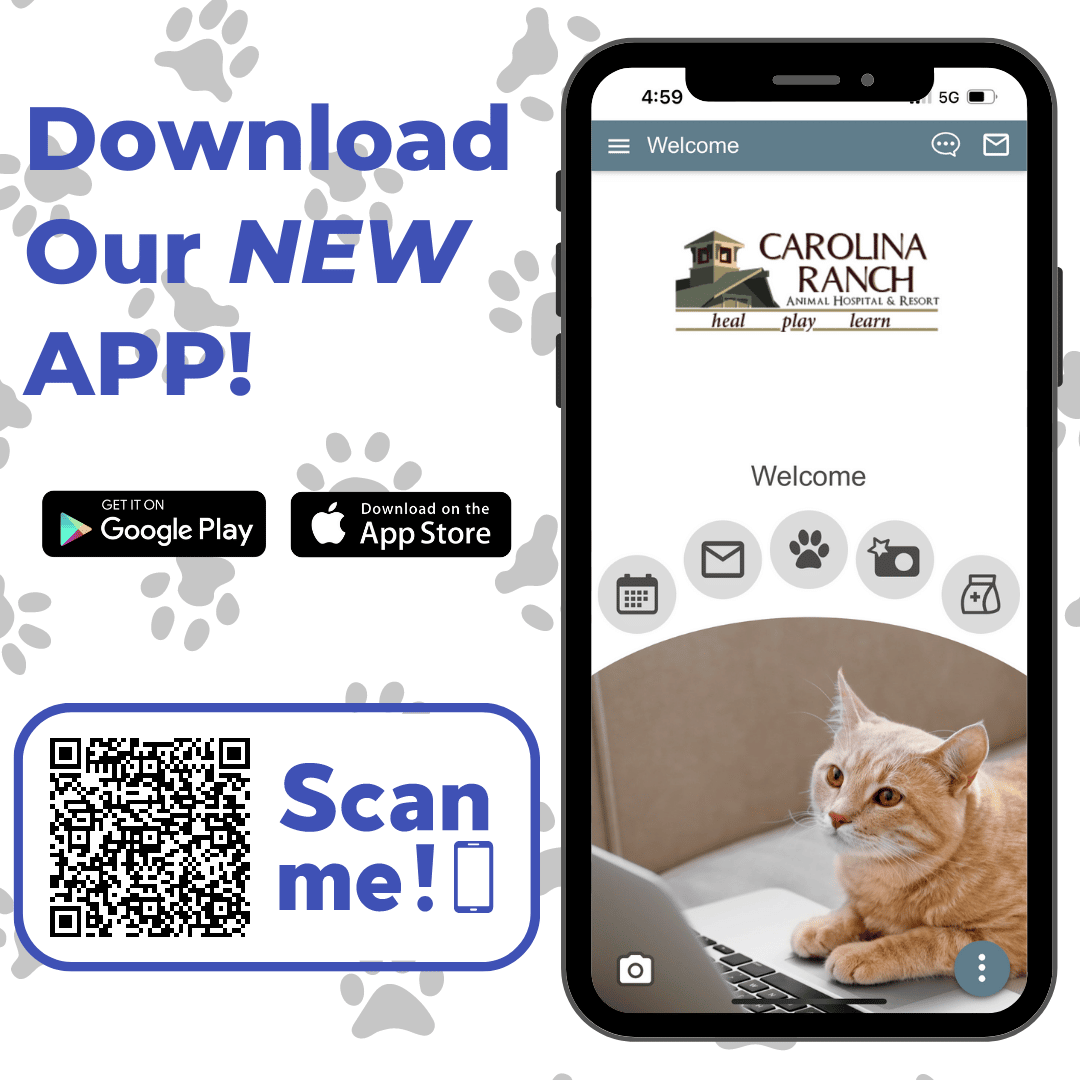Puppy’s First Vet Visit
Puppy Visit Overview
Congratulations on your new addition! Here’s what to expect at each of your puppy’s veterinary visits at Carolina Ranch. Between 8 and 16 weeks of age, we’ll want to see your puppy every 3-4 weeks.
At each visit we’ll do the following:
VACCINATIONS – Your puppy’s doctor and nurse will give the appropriate vaccinations based on age and lifestyle. INTESTINAL PARASITE PREVENTION – We’ll perform a fecal test at each puppy visit so please bring a stool sample to your puppy’s appointment. We’ll also deworm your puppy at each visit. PREVENTIONS – We’ll ensure your puppy has the appropriate heartworm and flea/tick prevention for their weight at each visit. EDUCATION – We’ll provide handouts and educational information to help you and your puppy navigate puppyhood successfully.
Puppy Guide
Use the drop downs below to learn about important topics regarding your new puppy!
It’s critical that our puppies develop positive associations with people, environments, surfaces, and other animals. While this process should be ongoing throughout puppyhood and into early adulthood, the most critical time (the time where you get the most “bang for your buck” is) during the first few months.
- MAKE SURE your puppy always feels safe! Your puppy should look interested – tail wagging, ears up/forward, eyes bright. If your puppy is hiding, cowering, isn’t willing to take food or has her tail tucked or ears back, move her away from what’s making her nervous.
- EXPOSE your puppy to various places, surfaces, and types of people. Consider sitting outside a grocery store with your puppy on your lap, feeding her treats as she watches people go by. Go to pet-friendly stores (e.g., Home Depot, Hobby Lobby, Michaels, Bass Pro Shops, etc.) and explore different locations like parks, woods, fields, the lobby at Carolina Ranch, trips for errands (if the weather is appropriate) and the like. The goal with these adventures is to have fun and enjoy exploring the world with you.
- AVOID dog parks and other places where dogs of unknown vaccine and health status congregate until your dog is fully vaccinated.
- AVOID places where larger or more rambunctious dogs may overwhelm your puppy.
- ASK yourself if off-leash group play is right for your puppy.
- CONSIDER checking out our Dogwarts Doggie Daycare program where the safety and comfortability of all participants are our first priority.
Housetraining feels overwhelming, but trust us, you’ll figure it out quickly! The biggest key is to pay attention. Here are some helpful hints:
- WHEN – Your puppy will need to use the bathroom right after eating, when she wakes up from a nap, after playing, and often up to hourly especially when very young.
- WHERE – Choose an appropriate location for your puppy’s elimination area. Take your puppy to the same location each time she goes. If she gets distracted, consider using a small exercise pen to enclose your chosen area and after she eliminates, she can go for a walk or play in the yard.
- WHAT to do when accidents happen – If you see your puppy suddenly eliminating where she shouldn’t, call her to you and head outside. Do NOT punish or scare her. This will have the opposite effect in many puppies, scaring them instead of teaching them. The goal is to anticipate when they need to go outside, so watch for these signs – suddenly stopping play, starting to sniff, and the moments listed under “when” above. For any of these, go right outside. Praise your puppy when she uses the right location.
- HOW – if your lifestyle requires potty pad rather than outdoors, ensure your puppy is confined to a small area with potty pads that have a small amount of urine on them. The urine will encourage your puppy to use that location. However, if your ultimate goal is for your puppy to use the outdoors for their elimination, avoid using potty pads to begin with as transitioning is difficult.
- If your puppy needs to be left alone for long period of time during the day, use a crate and ex-pen set up. We have an extensive blog post on training your puppy to enjoy their crate and for how to set up an elimination area in the ex-pen. Check out our blog for more info on crate training here.
Throughout your puppy’s life there will be times when she needs to be handled for grooming, nail trims, veterinary care, and medications. Cooperative husbandry makes life so much easier for your puppy, you and your veterinarian and groomer. Preparing her early will make this fun as well as easy. Gently handle your puppy’s body frequently – paws, ears, face, mouth, legs, and even tail. Make it easy and fun by rewarding frequently with treats.
Here are some important resources to help you learn more:
- "Cooperative Care: Seven Steps to Stress-Free Husbandry" by Deborah Jones Ph.D
- Cooperative Care with Deb Jones on YouTube
- Dr. Blackmer's Cooperative Care Playlist on YouTube
Pet insurance can help cover veterinary medical costs when your pet needs it by reducing the financial burden of unexpected expenses. Check out the following Pet Insurance Companies for more information:




